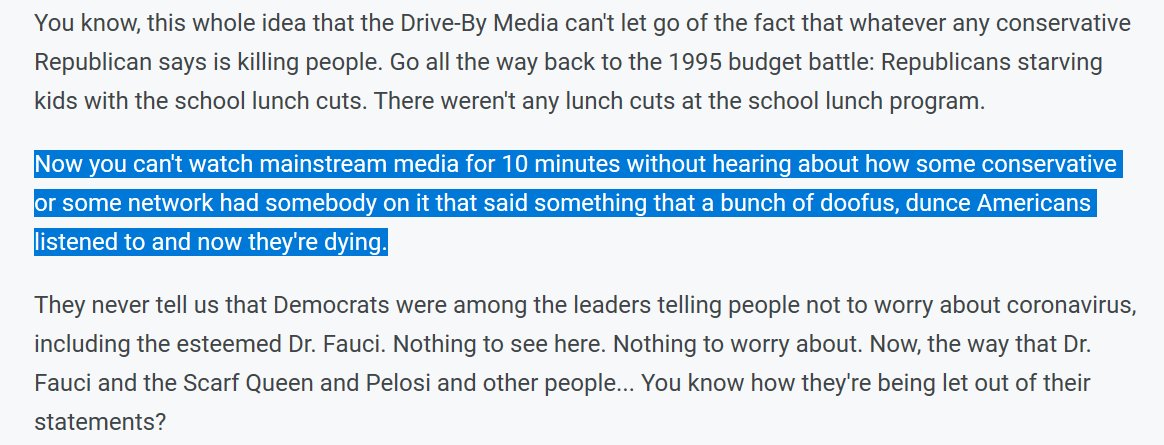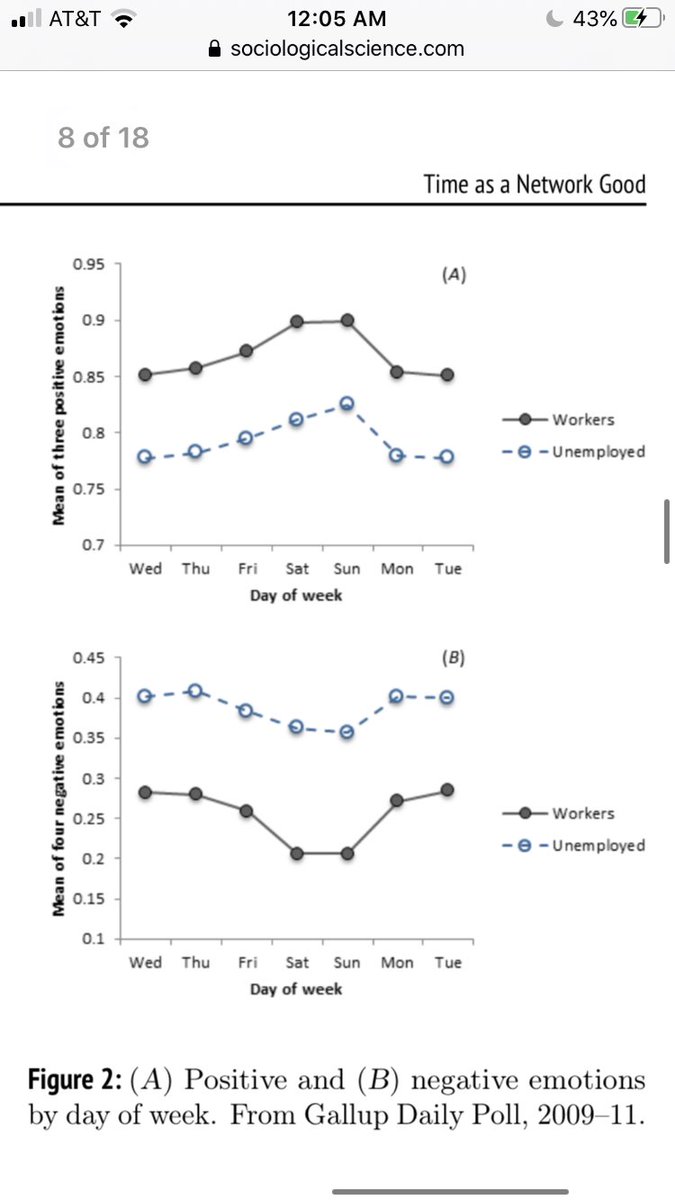
"Biblical" huh?
Would you like to know what the Bible actually says about Trumpism?
Because it has a lot to say that's amazingly contemporary, both about populist uprisings & elite response to them.
The parallels with Trump/@GOP are eerie.
<THREAD>
Would you like to know what the Bible actually says about Trumpism?
Because it has a lot to say that's amazingly contemporary, both about populist uprisings & elite response to them.
The parallels with Trump/@GOP are eerie.
<THREAD>
https://twitter.com/alexsalvinews/status/1330341145805611008
Consider the Sin of the Golden Calf (sefaria.org/Exodus.32?lang…)
The story is astounding:
How could people who'd communed with God at Sinai worship an idol just weeks after they'd accepted the 3rd commandment?
And why advertise how Israel behaves so badly, even on its own terms?

The story is astounding:
How could people who'd communed with God at Sinai worship an idol just weeks after they'd accepted the 3rd commandment?
And why advertise how Israel behaves so badly, even on its own terms?


As in the Hebrew Bible generally, the point of showing the heroes in their all-too-human fallibility is to teach us a relatable lesson.
But what's the lesson?
But what's the lesson?
There are undoubtedly many lessons embedded in the story
But a general lesson is about the social dynamics by which good people's sense of right and wrong can be perverted
More specifically, it's about the challenges of populism & how politicians fail in their responses to it
But a general lesson is about the social dynamics by which good people's sense of right and wrong can be perverted
More specifically, it's about the challenges of populism & how politicians fail in their responses to it
What do I mean?
Let's focus on 3 aspects of this process that resonate deeply today, especially for the Trumpists/@GOP (tho they apply generally, incl some leftist movements)
a) Grievances with the establishment
b) Common knowledge lies
c) Complicity by leaders who know better
Let's focus on 3 aspects of this process that resonate deeply today, especially for the Trumpists/@GOP (tho they apply generally, incl some leftist movements)
a) Grievances with the establishment
b) Common knowledge lies
c) Complicity by leaders who know better
a) Grievances with the establishment
The Torah is famously laconic about characters' motives.
Here though, the people describe their motives. As usually interpreted, it seems they're saying they feel leaderless with Moses missing. But pay attention to their words *in Hebrew*
The Torah is famously laconic about characters' motives.
Here though, the people describe their motives. As usually interpreted, it seems they're saying they feel leaderless with Moses missing. But pay attention to their words *in Hebrew*
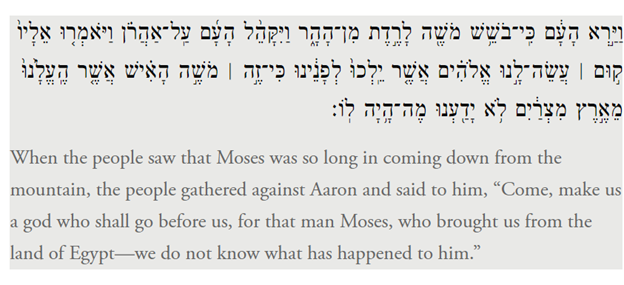
The usual translation is: They didn't know what had "happened to" or "become of" Moses. But this is a mistranslation of "haya lo," which should be "what he had" or "what he had possessed."
Don't believe me?
Here are the first 3 examples of this phrase in the Torah.


Don't believe me?
Here are the first 3 examples of this phrase in the Torah.



So what are they saying?
Well, it seems they're insinuating corruption or bad faith.
Moses "has" something. What they don't know, but it must be *something*
Rosenblum & Muirhead call this "conspiracy without the theory" (Not as new as they think...)
press.prineton.edu/books/hardcove…
Well, it seems they're insinuating corruption or bad faith.
Moses "has" something. What they don't know, but it must be *something*
Rosenblum & Muirhead call this "conspiracy without the theory" (Not as new as they think...)
press.prineton.edu/books/hardcove…
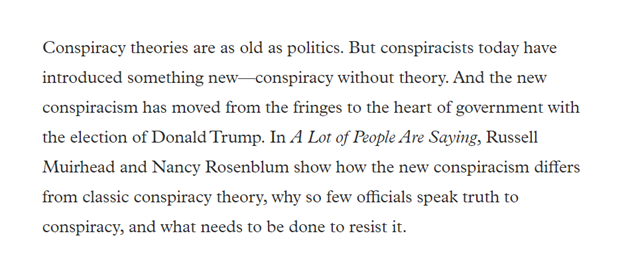
Does it seem farfetched they'd make such insinuations against Moses?
No.
They'd complained incessantly since leaving Egypt, incl just before Sinai.
At Rephidim, they accuse Moses of "raising them" from Egypt to kill them of thirst.
He fears they will stone him to death!
No.
They'd complained incessantly since leaving Egypt, incl just before Sinai.
At Rephidim, they accuse Moses of "raising them" from Egypt to kill them of thirst.
He fears they will stone him to death!
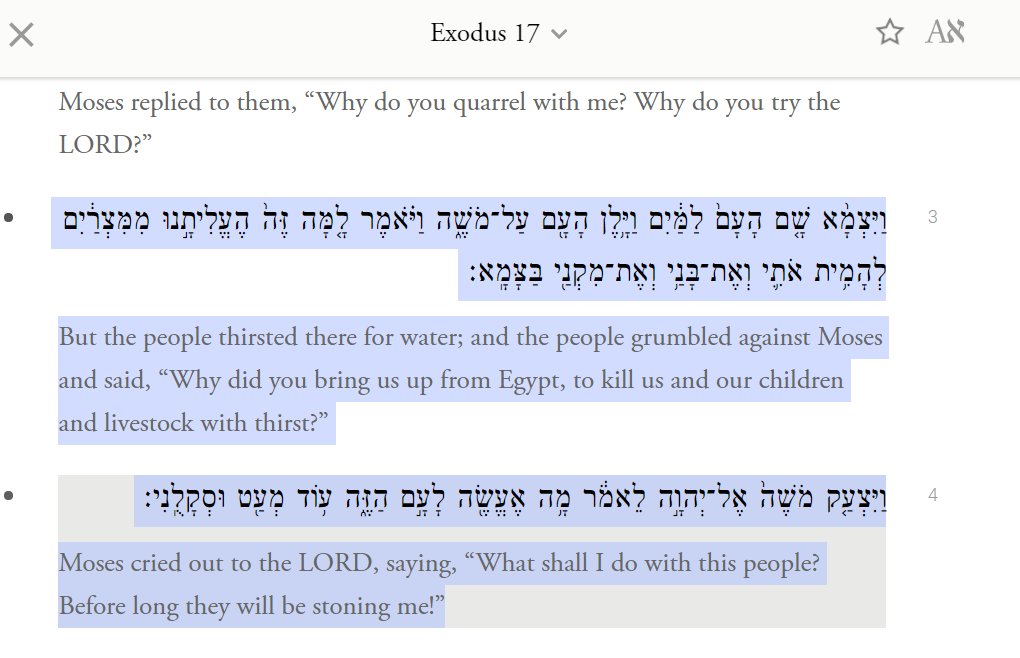
And in a later incident with many intertextual references to the Golden Calf incident (Korach’s Rebellion; sefaria.org/Numbers.16?lan…), Moses interprets a challenge to the leadership as tantamount to insinuations of corruption on his part. 

It's also curious that in their appeal to Aaron, the people say "that one, the 'ish' Moses."
"Ish" can mean "man."
But in biblical Hebrew it often means "distinguished personage." & interestingly, the only prior "Moses" with "Ish" is when describing his Egyptian *celebrity*

"Ish" can mean "man."
But in biblical Hebrew it often means "distinguished personage." & interestingly, the only prior "Moses" with "Ish" is when describing his Egyptian *celebrity*

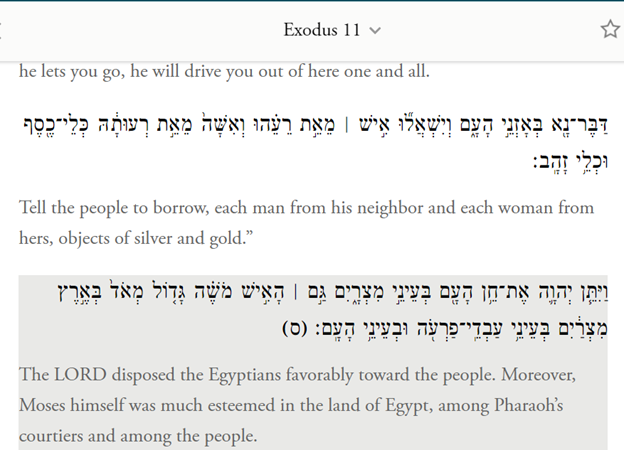
So calling out Moses's celebrity may be a bit of artful trolling.
More generally, it seems the people aren't just feeling leaderless but *aggrieved."
They have a beef with their political leadership, which they suspect of ruling in service of their own interests, not theirs.
More generally, it seems the people aren't just feeling leaderless but *aggrieved."
They have a beef with their political leadership, which they suspect of ruling in service of their own interests, not theirs.
Why do they feel so aggrieved?
This would require a much longer thread
Suffice it to say
(a) an alien, strict legal code has just been imposed on them
(b) they were promised a popular/democratic form of leadership but the waiting around for Moses raises big Qs about this
This would require a much longer thread
Suffice it to say
(a) an alien, strict legal code has just been imposed on them
(b) they were promised a popular/democratic form of leadership but the waiting around for Moses raises big Qs about this

b) Common knowledge lies
Let's now examine how the people act on their grievance.
It's natural to focus on their apparent apostasy.
In fact, Nahmanides argues persuasively that they're really replacing Moses ("Elohim" often means leader), not God.
Let's now examine how the people act on their grievance.
It's natural to focus on their apparent apostasy.
In fact, Nahmanides argues persuasively that they're really replacing Moses ("Elohim" often means leader), not God.
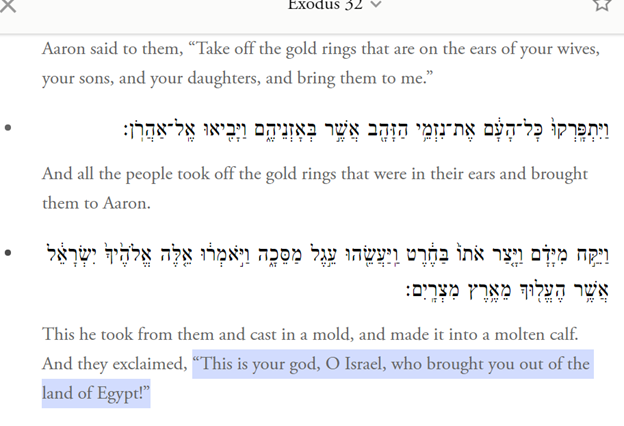
But that issue can be a distraction.
Focus instead on their bizarre claim that the calf "raised" them out of Egypt.
Not only did they just create the calf, but their very own words at Rephidim were that *Moses* had raised them out of Egypt & they repeated this moments before!

Focus instead on their bizarre claim that the calf "raised" them out of Egypt.
Not only did they just create the calf, but their very own words at Rephidim were that *Moses* had raised them out of Egypt & they repeated this moments before!
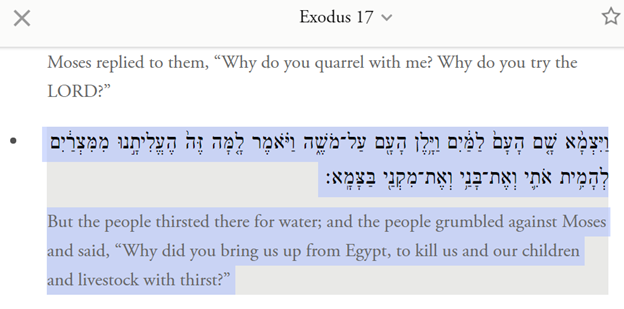
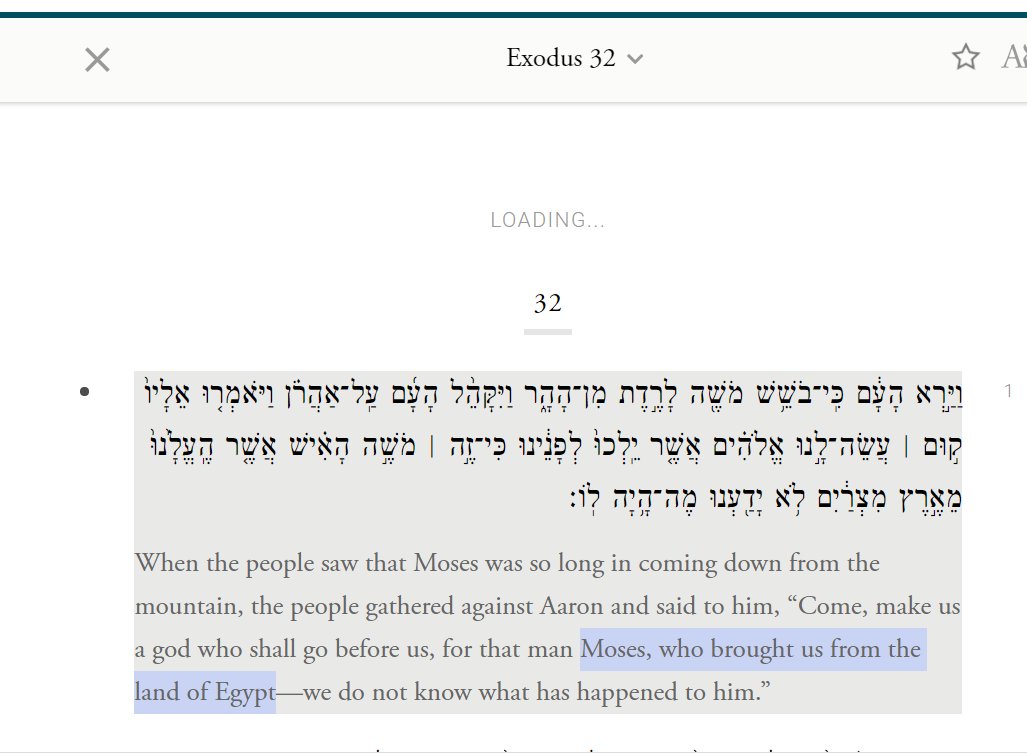
What's going on??
What we have here is a very particular kind of lie.
In our (@ohahl & @minjaekim22 ) research on how "lying demagogues" (like Trump) can be perceived as "authentic champions" for voters, we distinguish between "special-access" lies & "common knowledge" lies.

What we have here is a very particular kind of lie.
In our (@ohahl & @minjaekim22 ) research on how "lying demagogues" (like Trump) can be perceived as "authentic champions" for voters, we distinguish between "special-access" lies & "common knowledge" lies.
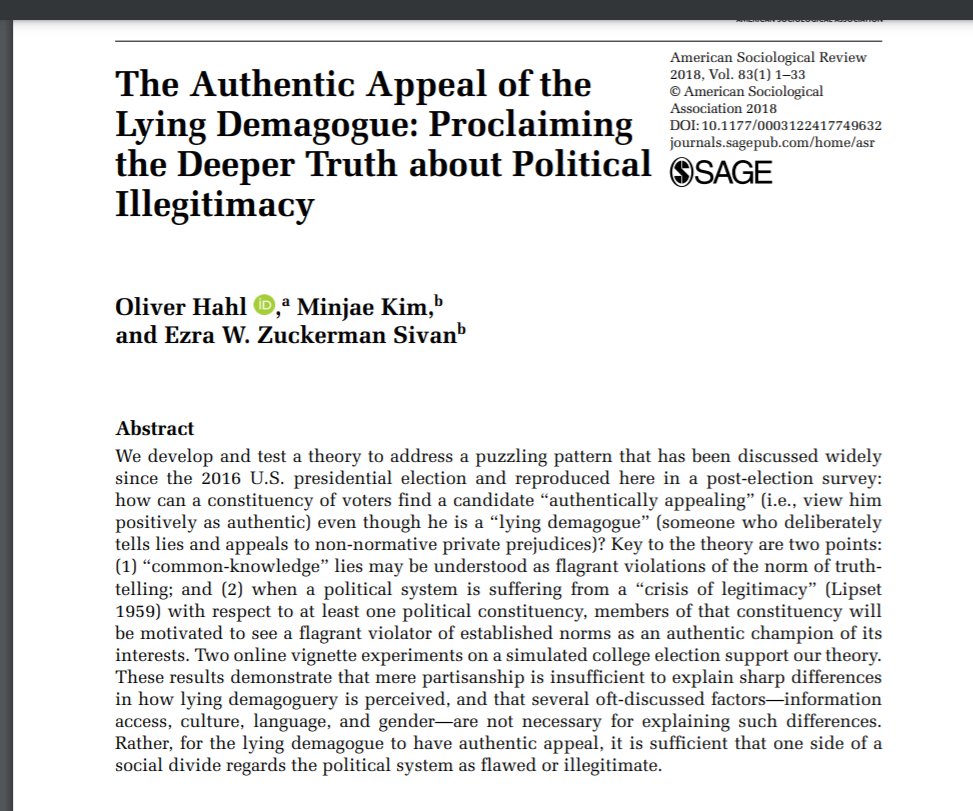
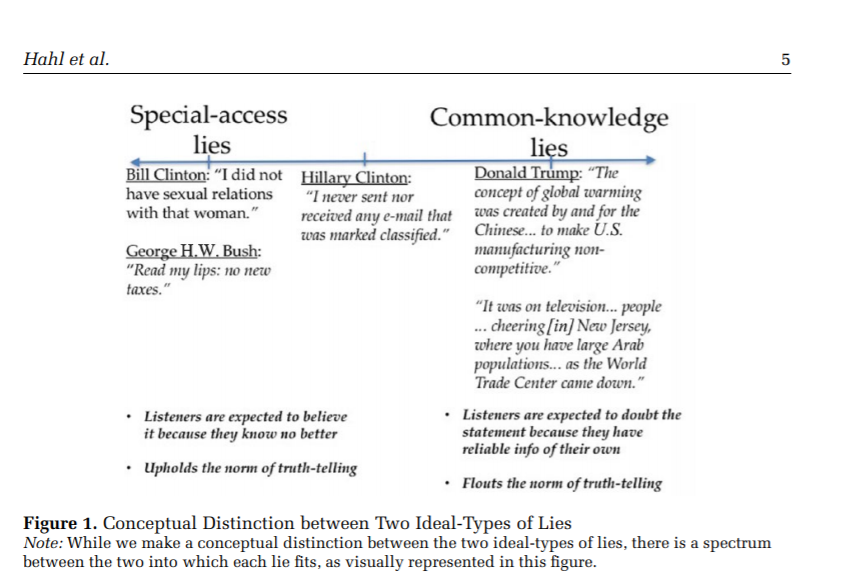
Trump tells lies of all kinds. But his most notorious are lies that *everyone knows* are false because he's saying things that contradict the evidence that's available to everyone & he doesn't even claim to have any special access to additional evidence.
Trump's "common knowledge" lies include
a. The size of the crowd at his inauguration
b. That the Chinese invented climate change to hurt US economy
c. That Arabs in New Jersey celebrated when the Twin Towers were felled
d. His promotion of the “birther” myth about Obama
a. The size of the crowd at his inauguration
b. That the Chinese invented climate change to hurt US economy
c. That Arabs in New Jersey celebrated when the Twin Towers were felled
d. His promotion of the “birther” myth about Obama
Research (incl ours) suggests some of Trump’s supporters surely believed these lies to be true.
But our research shows Trump supporters like such statements even when they know they're not true &/or don't follow norms of truth-telling (& social unity).
osf.io/g52um/
But our research shows Trump supporters like such statements even when they know they're not true &/or don't follow norms of truth-telling (& social unity).
osf.io/g52um/
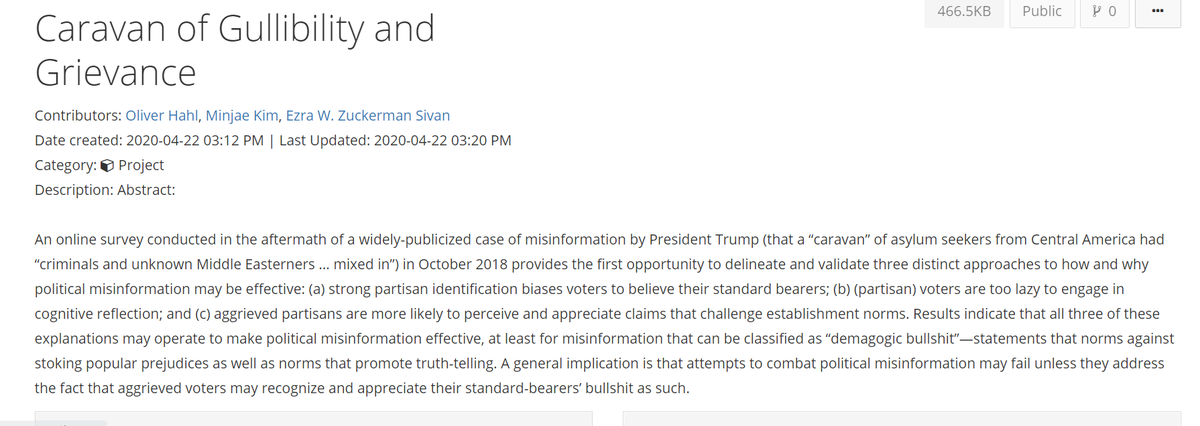
But what's the logic here?
Why make declarations everyone knows is false?
There are 2 complementary reasons.
The first is the one identified in our research:
Why make declarations everyone knows is false?
There are 2 complementary reasons.
The first is the one identified in our research:
An obvious lie, esp in a gen'l atmosphere of norm-breaking, is a really effective way to signal the “deeper truth” that "the people" are suffering under the rules/norms imposed by the "establishment"
It's a rallying cry to be taken seriously as a cri du coeur, but not literally.
It's a rallying cry to be taken seriously as a cri du coeur, but not literally.
The very fact that the "establishment" and its allies don't get this & get all outraged about the importance of shutting down the people's symbolic yoke-shedding (an "intifada" you might call it...) further reinforces the people's conviction they were right all along.
There's also a second advantage in getting people to declare or support obvious lies: it cements loyalty to the cause.
@mattyglesias had a great piece on this a few years ago.
The idea is well-founded in research on gangs, cults, & the mafia.
vox.com/policy-and-pol…
@mattyglesias had a great piece on this a few years ago.
The idea is well-founded in research on gangs, cults, & the mafia.
vox.com/policy-and-pol…

In short, nothing binds people together more tightly than when they show each other they're willing to act against
-- their obvious interests (e.g., by hurting oneself)
-- their obvious values (e.g., by hurting a family member)
-- their obvious beliefs (a common knowl lie)
-- their obvious interests (e.g., by hurting oneself)
-- their obvious values (e.g., by hurting a family member)
-- their obvious beliefs (a common knowl lie)
This process is dynamic-- an "escalation of commitment"
The 1st time you go along w something that contradicts deeply held values (eg supporting denigration of McCain's war service or tolerating "Access Hollywood"), it's difficult.
Less so though if you have social support.
The 1st time you go along w something that contradicts deeply held values (eg supporting denigration of McCain's war service or tolerating "Access Hollywood"), it's difficult.
Less so though if you have social support.
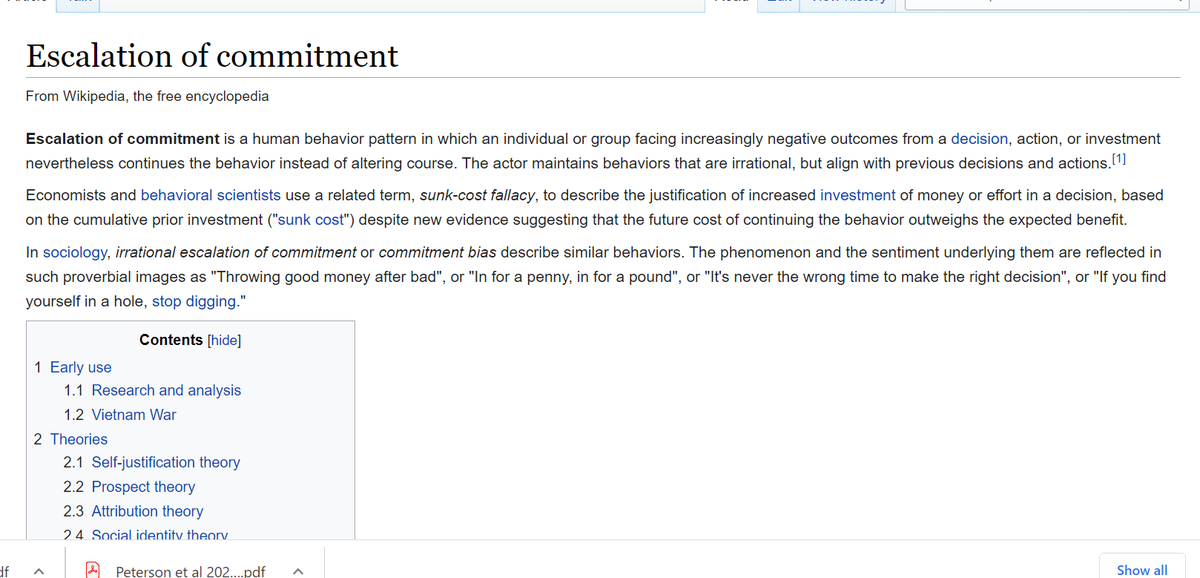
But having made the fateful choice to publicly violate one’s own values, it becomes very difficult to reverse oneself. To do so, you have to admit that you had experienced a failure of either mental acuity or moral judgment: What does that say about you?
Moreover, while it may be possible to rationalize a single such episode as a momentary lapse, how do you rationalize dozens? That's escalation of commitment: you're now “up a tree without a ladder.”
That's where most Trump supporters are today.
That's where most Trump supporters are today.
<BREAK in THREAD before part 3 on complicity of elites=Aaron in the story>
Please like or RT if you're interested in part 3.
If enough interest, will add ASAP.
Please like or RT if you're interested in part 3.
If enough interest, will add ASAP.
OK, so I'd say that 10+ ppl liking a 25+ tweet thread that's a mashup of biblical exegesis, social sci, & political criticism is enough of a vote of confidence to finish it off.
Here goes....
cc @ewzucker/Golden_Calf_of_Trumpism
Here goes....
cc @ewzucker/Golden_Calf_of_Trumpism
Let's take stock:
We have an aggrieved people who proclaim obvious lies in a norm-flouting campaign both to challenge an establishment they're accusing of corruption & to test/reinforce loyalty to their cause.
But how do they get the political leadership to go along?
We have an aggrieved people who proclaim obvious lies in a norm-flouting campaign both to challenge an establishment they're accusing of corruption & to test/reinforce loyalty to their cause.
But how do they get the political leadership to go along?
c) Complicity by leaders who know better
The Golden Calf story illustrates four mechanisms of complicity, as reflected in Aaron's responses:
1) Yielding to fear
2) Opportunism
3) Attempted cooptation
4) Yielding to awe
The Golden Calf story illustrates four mechanisms of complicity, as reflected in Aaron's responses:
1) Yielding to fear
2) Opportunism
3) Attempted cooptation
4) Yielding to awe
1) Yielding to fear
The clearest & most consistent explanation/excuse for Aaron's accommodation of the mob is in his first response when asked by Moses how he could brought the people to sin.
Essentially, it's:
"Don't blame me! You know (the people) are in a bad way!"
The clearest & most consistent explanation/excuse for Aaron's accommodation of the mob is in his first response when asked by Moses how he could brought the people to sin.
Essentially, it's:
"Don't blame me! You know (the people) are in a bad way!"
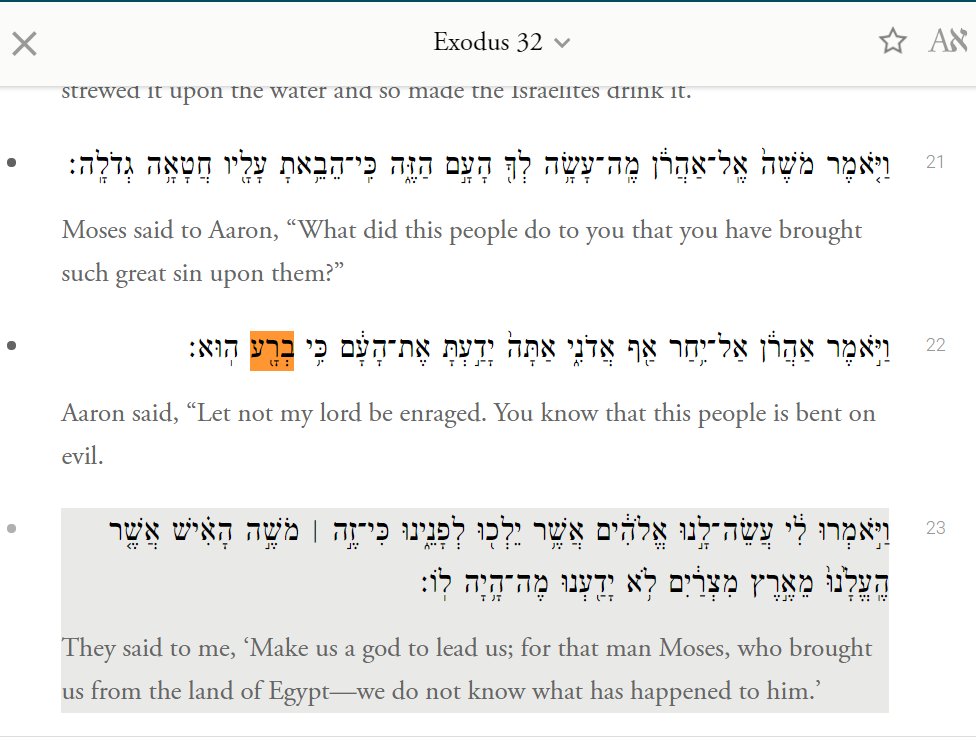
And indeed, Moses already knew this. It is stated as fact by the omniscient narrator & is the basis for the curious exchange between Moses & Joshua (apparently stationed up the mountain):
The people were evidently out of control in some "bad" way, though it wasn't clear how.
The people were evidently out of control in some "bad" way, though it wasn't clear how.
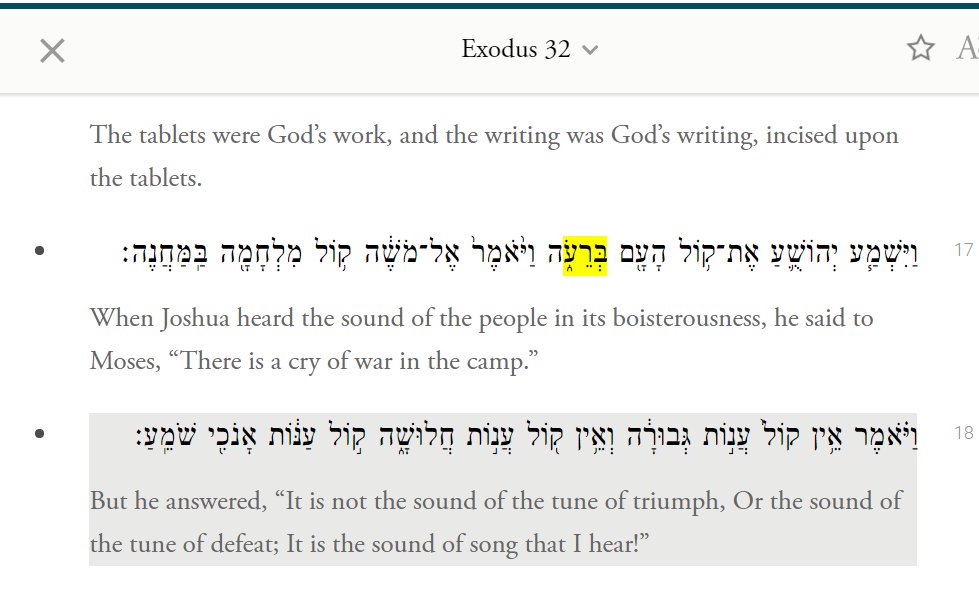
Also, Moses seems to echo Aaron's words in his summary assessment of the situation.
This is a tough verse to translate (in part bc it includes curious allusions to Pharaoh) but it seems both to affirm Aaron's report on the people's badness ('ra') & to suggest Aaron was culpable.
This is a tough verse to translate (in part bc it includes curious allusions to Pharaoh) but it seems both to affirm Aaron's report on the people's badness ('ra') & to suggest Aaron was culpable.
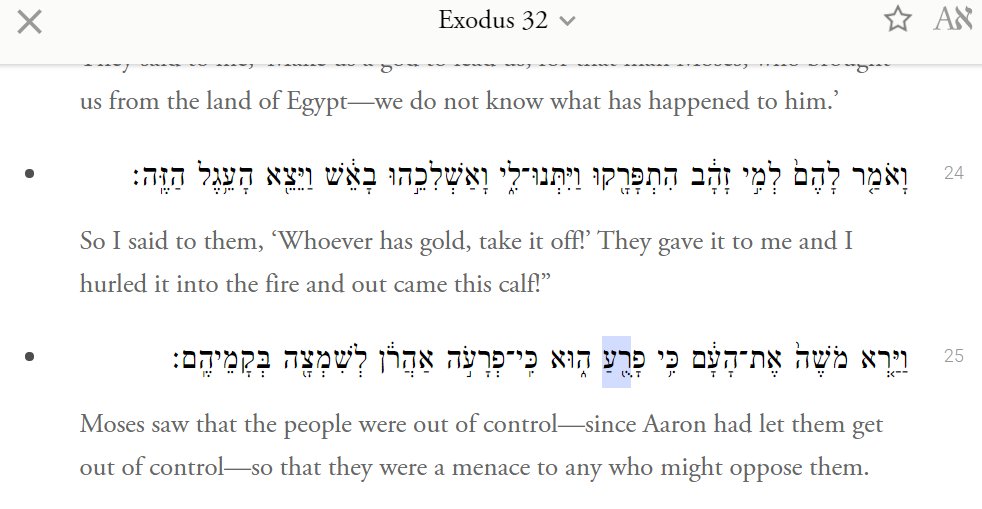
So, the first idea is a very straightforward one: Aaron essentially had no choice. If he hadn't accommodated the mob, they would have taken him out!
After all, hadn't Moses been worried they would stone him!
After all, hadn't Moses been worried they would stone him!
BTW, whatever happened to Hur? Anyone with an issue ("legal problems" is too specific a translation) was supposed to approach Aaron & Hur. But Hur (a hero, with Aaron & Joshua of Amalek war) is never heard from again. The midrash suggests it's bc the mob has killed him. 

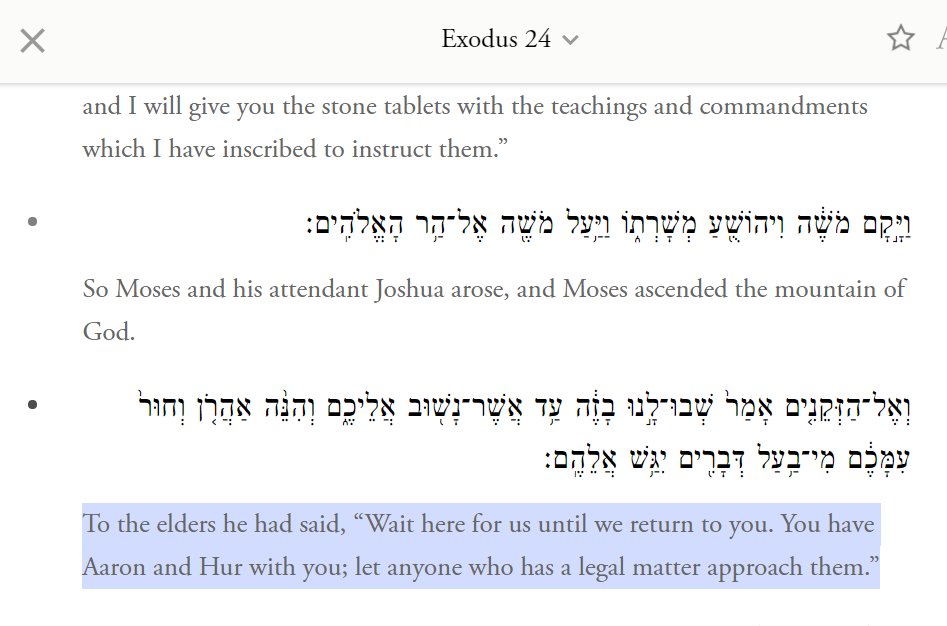
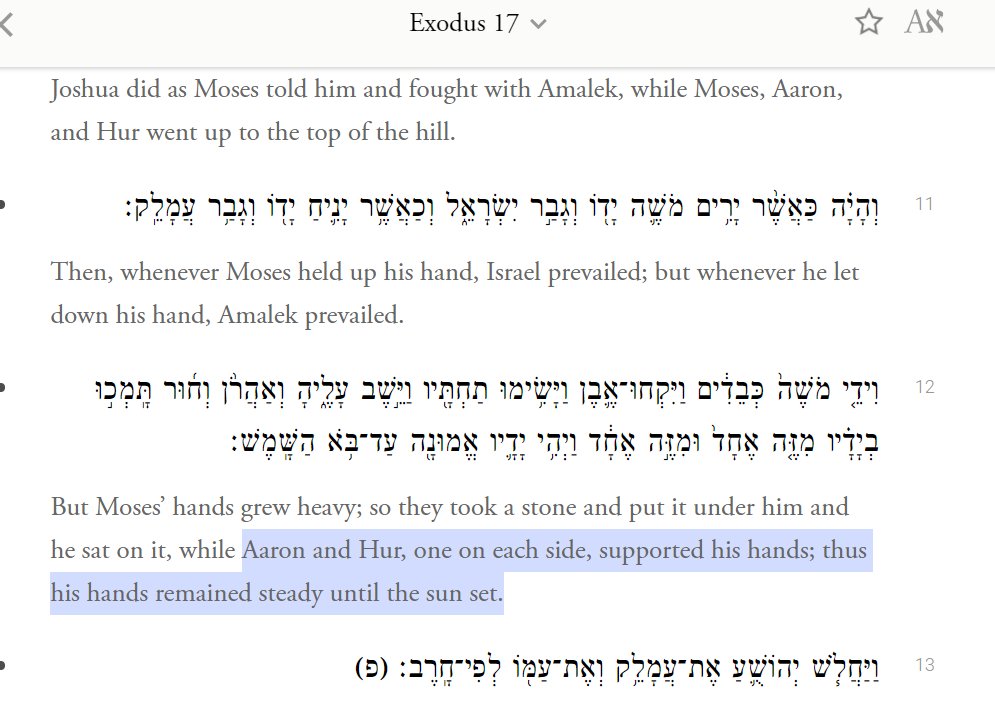
OK, so the first motive for complicity is fear-- pure & simple.
In the case of @GOP, this is obviously relevant though not fear for one's life but for the end of one's political career. This of course explains why so few up for reelection were willing to speak out ag Trump.
In the case of @GOP, this is obviously relevant though not fear for one's life but for the end of one's political career. This of course explains why so few up for reelection were willing to speak out ag Trump.
2) Opportunism.
The second motive shows up in our story in what's not said than in what's said & I have to give credit to my son Jack for prompting me to see it.
The key is to consider what Aaron's response *should've been* when the people complained about Moses.
The second motive shows up in our story in what's not said than in what's said & I have to give credit to my son Jack for prompting me to see it.
The key is to consider what Aaron's response *should've been* when the people complained about Moses.
Right!
He should have defended his brother! He should have explained that they should be patient, that Moses would be back soon, & to consider all the things that Moses & God had done for them & how it's wrong to insinuate ulterior motive with no evidence-- i.e. misinformation!
He should have defended his brother! He should have explained that they should be patient, that Moses would be back soon, & to consider all the things that Moses & God had done for them & how it's wrong to insinuate ulterior motive with no evidence-- i.e. misinformation!
But he doesn't do that.
And maybe it's just the fear.
But maybe just maybe, he sees an opportunity to stop being second-fiddle to his little brother.
He certainly speaks with Mosesian authority when he instructs the people to "Break off the golden rings...."!
And maybe it's just the fear.
But maybe just maybe, he sees an opportunity to stop being second-fiddle to his little brother.
He certainly speaks with Mosesian authority when he instructs the people to "Break off the golden rings...."!
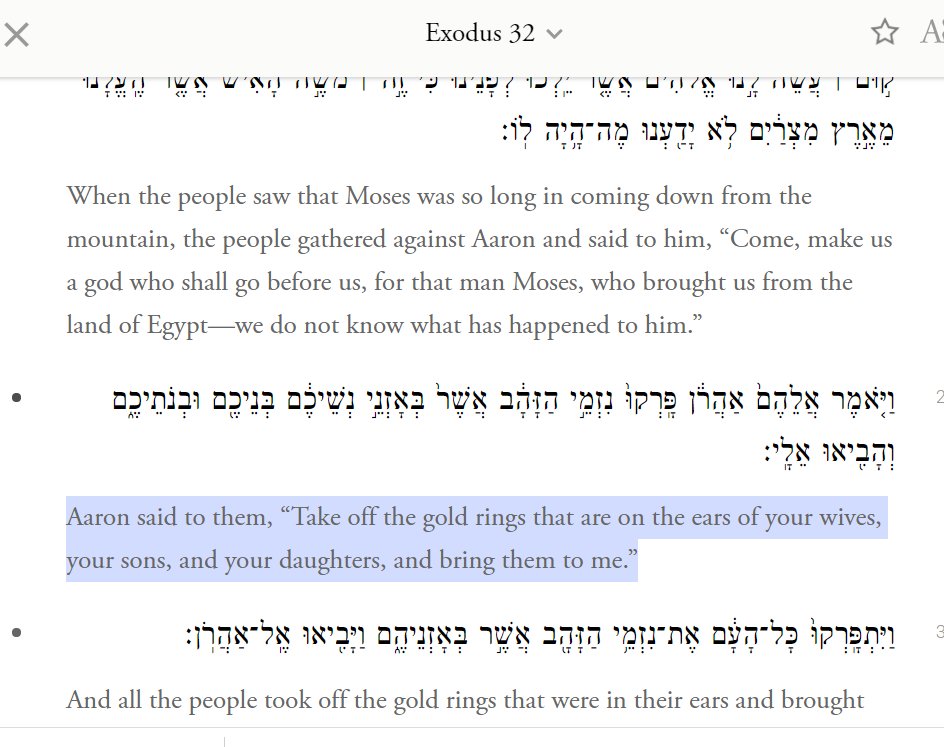
Obviously, opportunism is very salient for the @GOP as well, especially so for all the people who were considered losers or unserious in the past-- the Michael Flynns & Stephen Millers & Jared Kushners. This was their opportunity to shine!
3) Attempted cooptation
Let's now look at Aaron's response when he sees the golden calf. Whereas the people cry out that the calf represents the "elohim (leaders/authorities/gods) that raised them out of Egypt," Aaron pointedly does not echo their words.
Let's now look at Aaron's response when he sees the golden calf. Whereas the people cry out that the calf represents the "elohim (leaders/authorities/gods) that raised them out of Egypt," Aaron pointedly does not echo their words.

Rather, he uses the four-letter Tetragrammaton (rendered here as "Lord") to declare a festival the next day.
Moreover, the festival that Aaron oversees has striking continuity with the festival prior to Moses's ascent on Sinai: a) bulls; b) burnt offerings; c) peace offerings
Moreover, the festival that Aaron oversees has striking continuity with the festival prior to Moses's ascent on Sinai: a) bulls; b) burnt offerings; c) peace offerings
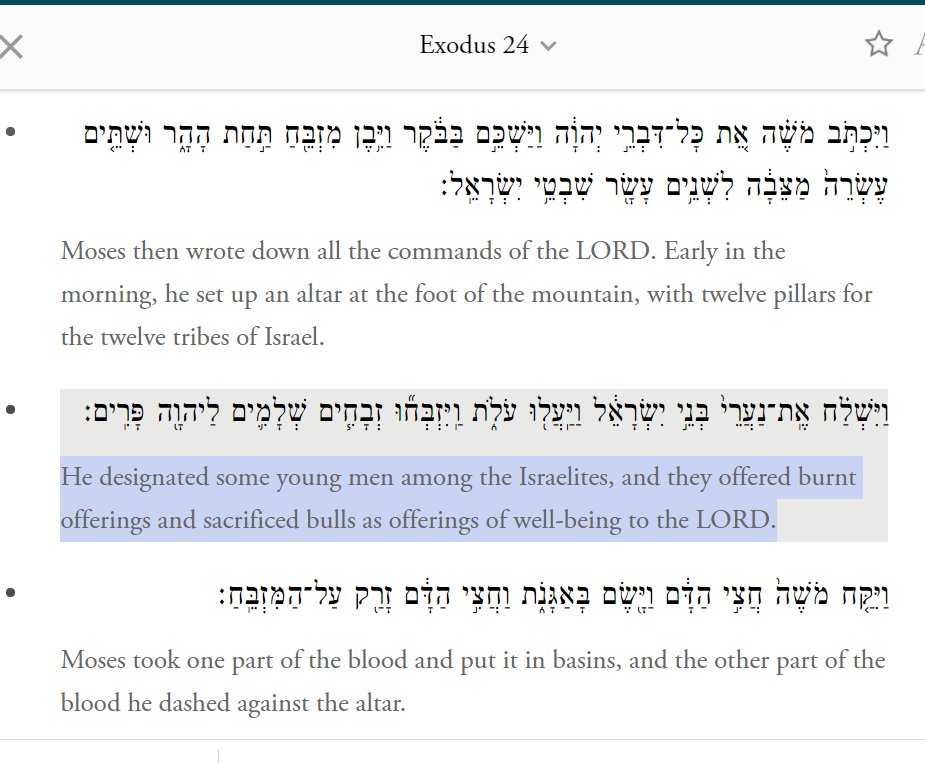
The upshot is that Aaron is trying to channel or co-opt a problematic populist movement towards traditional/legitimate ends, thereby purifying/sanitizing the movement & his accommodation of it.
If they're worshipping God rather than the calf, what could be wrong with that?
If they're worshipping God rather than the calf, what could be wrong with that?
Boy is this the @GOP!
Tax cuts, deregulation, attacking ACA, conservative judges... U name it!
The @GOP's success at getting such goodies out of Trump made it *easier* to stomach stuff that would've been @GOP sacrilege (tariffs, sucking up to Russia, betraying allies, etc)!
Tax cuts, deregulation, attacking ACA, conservative judges... U name it!
The @GOP's success at getting such goodies out of Trump made it *easier* to stomach stuff that would've been @GOP sacrilege (tariffs, sucking up to Russia, betraying allies, etc)!
4) Yielding to awe
The final motive doesn't get nearly enough play.
In the case of the Golden Calf, it is hinted at in this very odd statement of Aaron's. Whatever could he mean by the fact when he says that he just threw the gold into the fire & the calf came out??!!
The final motive doesn't get nearly enough play.
In the case of the Golden Calf, it is hinted at in this very odd statement of Aaron's. Whatever could he mean by the fact when he says that he just threw the gold into the fire & the calf came out??!!
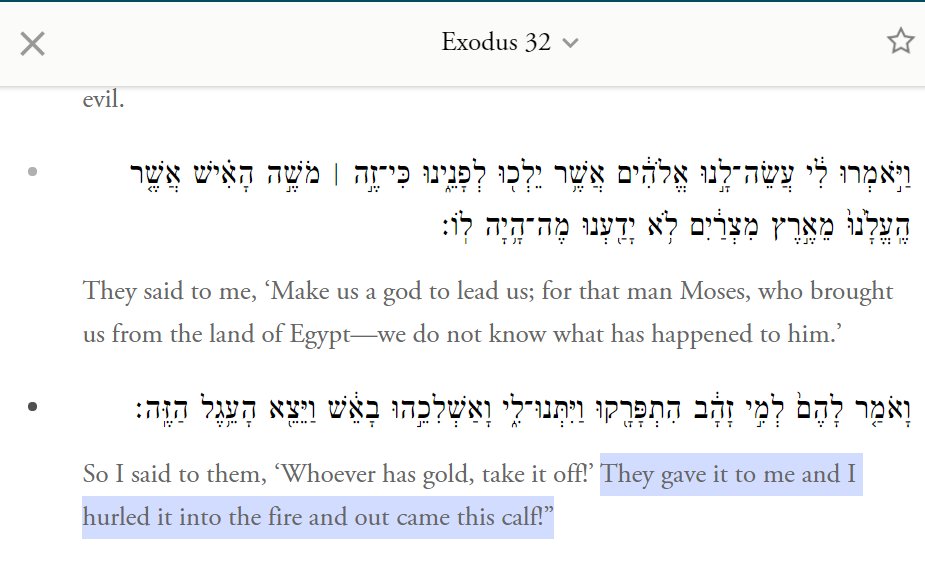
This is another common-knowledge lie. It's not just that it directly contradicts what actually happened. (He was the one who made the calf!) It's that Aaron *knows Moses won't believe him (& he knows Moses knows this!) when he claims it happened on its own.* It makes no sense! 
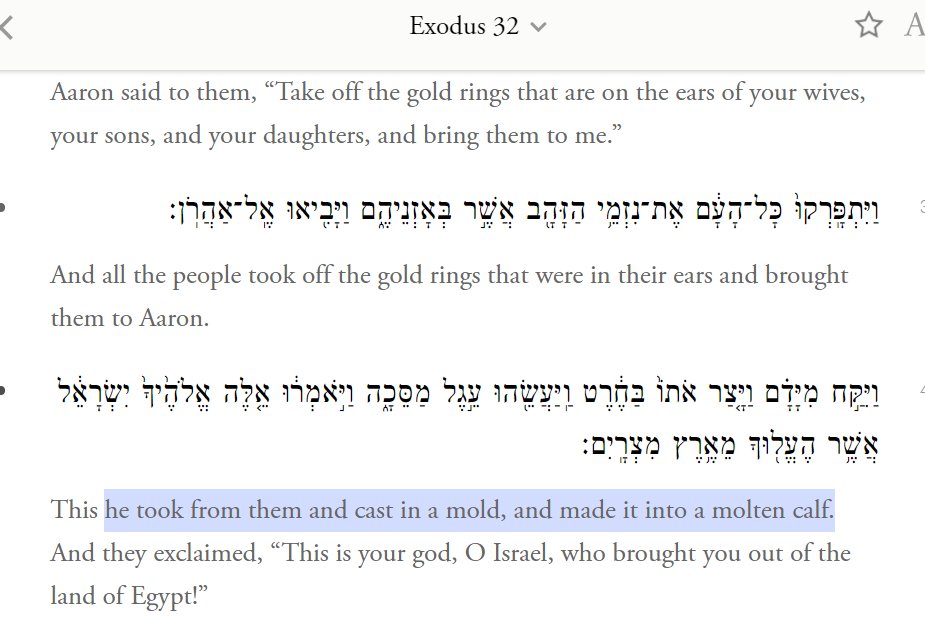
So what's going on.?
Again, the key to common-knowledge lies is that they hint at deeper points below the surface. What is it here?
Aaron is saying something supernatural occurred, something that was beyond him. He couldn't have done it on his own & neither could the people.
Again, the key to common-knowledge lies is that they hint at deeper points below the surface. What is it here?
Aaron is saying something supernatural occurred, something that was beyond him. He couldn't have done it on his own & neither could the people.
Aaron is marveling at the transcendent, creative energy behind the populist movement & is so in awe of its power & how we was swept along with it.
"What hath God wrought?" asked the inventor of the telegraph.
The inventor of the golden calf asked pretty much the same thing.
"What hath God wrought?" asked the inventor of the telegraph.
The inventor of the golden calf asked pretty much the same thing.

This feeling of awe at powerful, collective creative forces- & the tendency to ascribe divinity to them-- is an underrated element in @GOP complicity. It's not simply about fear, the opportunism, or the cooptation.
It's about awe.
It's about awe.
Think of a large Trump rally and the “collective effervescence” it creates.
Think of the amount of human excitement and creativity that is reflected in collective construction of the QAnon “research movement,” one that @mimbsy likens to a new religion: theatlantic.com/newsletters/ar…
Think of the amount of human excitement and creativity that is reflected in collective construction of the QAnon “research movement,” one that @mimbsy likens to a new religion: theatlantic.com/newsletters/ar…
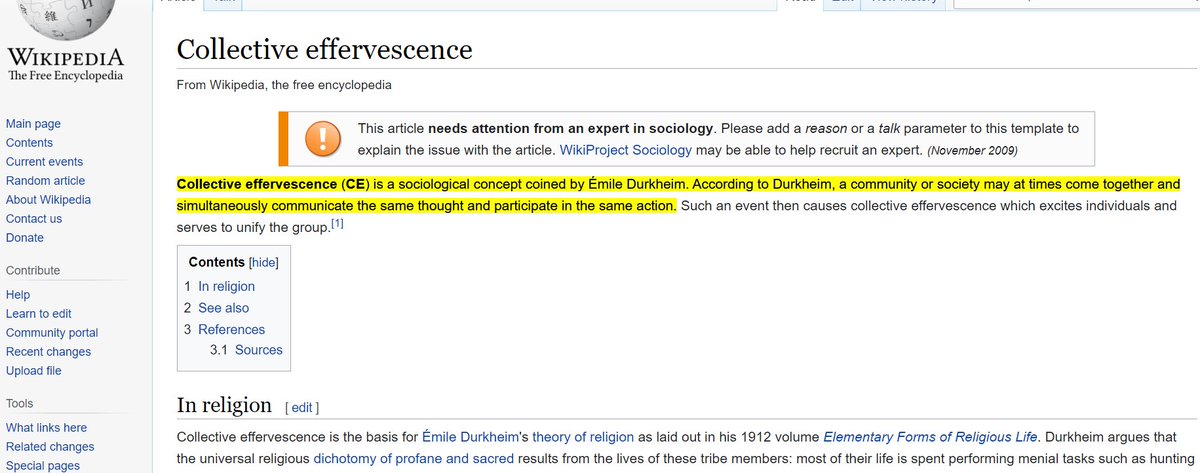
There's something incredibly impressive about this collective myth construction.
After all, the greatest of human achievements rest on precisely such social processes, the very ones that amaze us & inspire religious metaphors. Their social truths are powerful & undeniable.
After all, the greatest of human achievements rest on precisely such social processes, the very ones that amaze us & inspire religious metaphors. Their social truths are powerful & undeniable.
I think this 4th motive is the most important motive why people succumb to false gods & why @GOP succumbed to Trump. It captures the feeling of being swept along by something that *feels undeniably good & true* even if it's in fact false & evil.
Bc there *is* a truth in it!
Bc there *is* a truth in it!
I want to end this thread on a very important *difference* between the Sin of the Golden Calf and Trump/@GOP (there are a few...):
There's no lying demagogue in the Golden Calf story!!
There's no lying demagogue in the Golden Calf story!!
If you think about it, it's astounding.
How did the people mobilize itself to come before Aaron with those allegations and push him to do the unthinkable? How did they deal with the elders? with Hur?
The Torah is silent on this!
How did the people mobilize itself to come before Aaron with those allegations and push him to do the unthinkable? How did they deal with the elders? with Hur?
The Torah is silent on this!
And later, when the "Sons of Levi" rally to defend God and must kill each man's "brother, neighbor, & kin," we are not told who their opponents were (apparently only a small fraction of the people, after all!) & whether they put up any resistance. 

And lest you think this is an oversight, Korach's Rebellion certainly gives the names of the rebels.
So this is a literary choice, one that simultaneously downplays:
a. the importance of the populist leadership &
b. the differences between participants & nonparticipants
So this is a literary choice, one that simultaneously downplays:
a. the importance of the populist leadership &
b. the differences between participants & nonparticipants
The implication: Culpability in such episodes is collective.
No Trump supporter can point at Trump & shirk responsibility. If you voted Trump, you're responsible for all of it: the corruption, the bigotry, the attack on truth, the betrayal of American values & interests.
No Trump supporter can point at Trump & shirk responsibility. If you voted Trump, you're responsible for all of it: the corruption, the bigotry, the attack on truth, the betrayal of American values & interests.
As for the responsibility of Trump opponents, that's a trickier question.
I do think every one of the social processes discussed in this thread can be identified in left movements at various times & places.
There's nothing here that's especially right-wing or conservative.
I do think every one of the social processes discussed in this thread can be identified in left movements at various times & places.
There's nothing here that's especially right-wing or conservative.
Put differently:
We're all in Aaron's/@GOP's place at one time or another.
Let's hope and pray we learn from their examples & do better.
/FIN
We're all in Aaron's/@GOP's place at one time or another.
Let's hope and pray we learn from their examples & do better.
/FIN
P.S. If you're interested in more of my work that meshes sociology & Hebrew Bible, see thelehrhaus.com/author/ezrazuc… (last essay also has implications for contemp politics)
& if you have ideas where I might publish this Golden Calf of Trumpism piece, lmk; haven't figured that out yet.
& if you have ideas where I might publish this Golden Calf of Trumpism piece, lmk; haven't figured that out yet.
@threadreaderapp unroll
• • •
Missing some Tweet in this thread? You can try to
force a refresh

